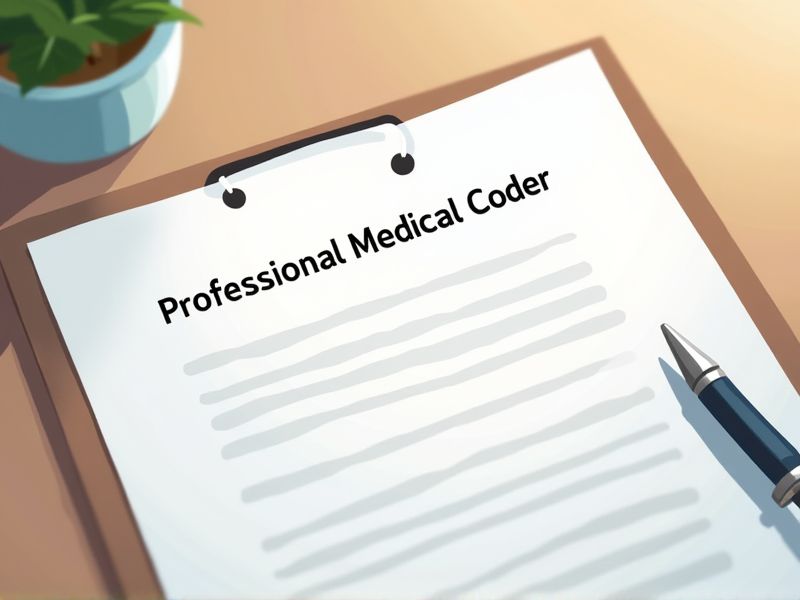
Professional medical coders translate patient data into standardized codes, ensuring accuracy in billing and record-keeping. Certifications validate a coder's expertise in this complex system, enhancing their credibility in the healthcare industry. Employers often require specific credentials to comply with regulations and maintain quality standards. Key certifications include those that ensure proficiency and knowledge in medical coding intricacies.
AAPC Certified Professional Coder (CPC)
Professional medical coding requires accuracy and adherence to standardized processes, and the AAPC Certified Professional Coder (CPC) credential validates a coder's proficiency in these areas. The CPC certification is widely recognized in the healthcare industry, enhancing job prospects and often resulting in higher salaries. Employers rely on CPC-certified coders because they demonstrate a thorough understanding of medical terminology, coding guidelines, and insurance regulations. The certification also ensures coders are up-to-date with current coding updates and trends, reducing errors and improving healthcare reimbursement processes.
AHIMA Certified Coding Specialist (CCS)
Earning the AHIMA Certified Coding Specialist (CCS) credential enhances a medical coder's credibility by validating their expertise in coding systems like ICD-10-CM/PCS and CPT. Employers often seek certified professionals to ensure accurate and efficient coding, which can reduce errors and streamline billing processes. The CCS certification demonstrates a coder's commitment to maintaining industry standards and continuous professional development. Having this credential often leads to increased job opportunities and higher earning potential in the healthcare field.
AAPC Certified Outpatient Coder (COC)
Obtaining the AAPC Certified Outpatient Coder (COC) credential equips medical coders with specialized knowledge in outpatient services, which is essential for accurate billing and compliance with specific regulations. The healthcare industry demands precision in coding to prevent claim denials and ensure correct reimbursement; a COC certification validates this expertise. With outpatient services growing due to healthcare shifts, a COC ensures coders stay aligned with current best practices and industry standards. Employers prioritize certified individuals who demonstrate proficiency, increasing job opportunities and career advancement for those holding a COC.
AAPC Certified Inpatient Coder (CIC)
AAPC Certified Inpatient Coder (CIC) validates a coder's expertise in handling complex inpatient hospital coding scenarios. Hospitals face stringent regulations and rely on CIC for accurate DRG assignments to ensure correct billing and compliance. Employers often prefer CIC-certified professionals, boosting job prospects and career advancement. With healthcare standards continually evolving, CIC certification promotes ongoing professional development, enhancing skill sets.
AAPC Certified Professional Coder-Hospitals (CPC-H)
AAPC's Certified Professional Coder-Hospitals (CPC-H) credential ensures a coder's proficiency in the complexities of hospital coding systems, which leads to increased job opportunities and higher earning potential. Healthcare facilities require coders with CPC-H certification to maintain compliance with industry regulations and minimize the risk of billing errors. The credential validates that a coder has a comprehensive understanding of medical terminology, coding guidelines, and payer policies, which enhances the accuracy of medical documentation. As hospitals continually aim to improve operational efficiency, hiring certified coders contributes to streamlined revenue cycles and reduced claim denials.
AHIMA Certified Coding Specialist-Physician-based (CCS-P)
The AHIMA Certified Coding Specialist-Physician-based (CCS-P) credential demonstrates expertise in coding procedures and diagnoses for physician services, ensuring accuracy and compliance with healthcare regulations. Accurate coding is crucial for proper billing and reimbursement, reducing financial errors and enhancing revenue cycle management. A CCS-P certification signals mastery of coding systems like CPT, ICD-10-CM, and HCPCS, which are vital for navigating complex medical documentation. Employers and healthcare organizations value certified professionals to minimize risk and optimize operational efficiency in medical coding practices.
AHIMA Certified Documentation Improvement Practitioner (CDIP)
AHIMA's Certified Documentation Improvement Practitioner (CDIP) credential enhances a medical coder's understanding of clinical documentation requirements, leading to more accurate coding. It improves the coder's ability to ensure compliance with healthcare regulations, reducing the risk of audits and penalties. Enhanced documentation insight helps in capturing the true picture of patient care, affecting reimbursement rates positively. The credential equips coders with skills to collaborate effectively with healthcare providers, which streamlines the documentation process.
AAPC Certified Professional Medical Auditor (CPMA)
Medical coders benefit from AAPC Certified Professional Medical Auditor (CPMA) certification due to increased accuracy in coding and billing. This certification enhances their ability to identify discrepancies, reducing billing errors and potential financial losses for healthcare organizations. Employers often prefer certified auditors, leading to improved career prospects and job security for coders. Furthermore, possessing a CPMA credential can lead to higher earning potential by showcasing specialized expertise in medical auditing.
AHIMA Registered Health Information Technician (RHIT)
Demand for AHIMA Registered Health Information Technicians arises from their ability to ensure coding accuracy and compliance with healthcare regulations. Their expertise directly impacts the quality of medical records, which supports efficient patient care and accurate billing. The healthcare industry's reliance on data analysis for decision-making underscores the importance of RHITs in managing and interpreting health information. Professional Medical Coders benefit from RHITs' proficiency in organizing and maintaining health data, which enhances operational efficiency and reduces errors.
AAPC Certified Risk Adjustment Coder (CRAC)
The AAPC Certified Risk Adjustment Coder (CRAC) credential ensures coders are skilled in the specialized domain of risk adjustment coding, which is crucial for accurately predicting future healthcare costs. Professional medical coders with the CRAC certification demonstrate a comprehensive understanding of diagnosis coding guidelines, directly impacting reimbursement models. Healthcare organizations rely on risk-adjusted coding expertise to optimize revenue cycles and maintain compliance with regulatory standards. Coders with this certification are equipped to enhance data quality and integrity, which supports clinical and financial decision-making in healthcare settings.
Summary
When you obtain certifications as a Professional Medical Coder, you enhance your credibility and expertise in the healthcare industry. This leads to better job prospects and can significantly increase your earning potential. Employers recognize your certified skills, making you a more attractive candidate for various opportunities. Achieving these certifications also keeps you updated with industry standards, ensuring compliance and accuracy in medical coding tasks.
